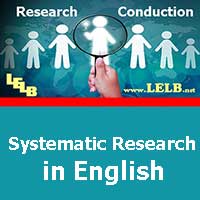Research Questions
Research Questions and their delicate specifications:
- Each research question should have a tentative response.
- Research questions are the questions for which answers are being sought.
- The questions are built on one another. In other words, the questions must be interrelated and not distinctly separated from each other.
- They should not be formulated as predictions.
- They should be clearly formulated and unambiguously worded.
- They should address current issues.
- They need to be sufficiently narrow and constrained so that they can be answered.
- They should be theoretically interesting and engrossing.
- The conclusion sections of many articles suggest questions for further research.
- They can also originate from extensive reading through existing researches.
- They may also originate from your observations in or out of a classroom context to satisfy your curiosity.
- The researcher must first make sure that others have not conducted his/her study, so he should consult a citation index (see your university librarian) to locate work that has cited the paper on which you will be basing your study. Another way of locating relevant information is through web-based studies, which often yields studies published in a range of venues.
- Research problems are generally expressed in terms of research questions and/or hypotheses.
- They form a part of the theoretical framework.
- Research hypotheses stem from research questions. E.g., if we have three research questions, then at least we should have three research hypotheses.



